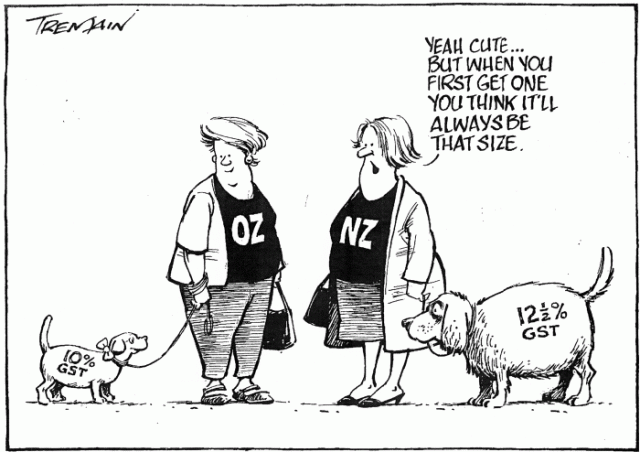Search
Democracy Links
Member's Off-site Blogs
the con ....

It should come as no surprise that here in Canberra ACT Labor Party Chief Minister Katy Gallagher supports an increase in the Goods and Services Tax (GST) and broadening its base. It was Labor ‘Messiah,’ the neoliberal Paul Keating, who first proposed a broad based consumption tax for Australia in 1985 and only backed down when the unions got cold feet at the last minute.
Like Colin Barnett, Gallagher runs a capitalist government looking for more revenue.
What better way to do that than to increase the tax burden on the poor and working class? That essentially is what consumption taxes do.
The specific GST proposals being floated would see the rate increase from its current 10% to say 12.5% and/or include currently exempt items like fresh food, health and education. Removing those exemptions would add about $15 billion to the revenue of the States and Territories.
Gallagher disguised this class reality with talk of an efficient tax. Yes, the GST is efficient. These are taxes that impact less on capital accumulation than other types of taxes.
So when policy makers and politicians talk about efficient taxes what they often mean is taxes that impact more on workers and the poor but less on capital and the rich.
Finding ways to tax the working class more and capital less was effectively what the Henry Tax Review was about.
There are a few reasons for this. First the demands on government for services will continue if not increase given for example an aging population.
Obviously cutting social welfare spending and spending on public health and education would reduce the need for revenue and that has been part of the policy response of both parties over time.
Too brazen an attack on government expenditure might produce a concerted backlash. Social stability is an aim of major sections of capital because they realise that class peace is the best environment for business and profitability.
Second, reliance on income tax ties revenue raising very closely to the health of the economy. That is true but less so for consumption taxes, especially if essentials like fresh food, health and education are included in the tax base.
Land taxes are also efficient and more likely to raise revenue from the working class in both good and bad economic times. The Gallagher Labor government is in the process of replacing over the long term stamp duty on conveyancing with increased land tax to position itself in the future with a stable tax base on the working class. I note that I, like many current home owners, will bear the burden of both.
Third, international competition for funds will force the Australian government to cut taxes on mobile capital. Taxes on labour – the GST and land taxes – are the obvious replacement.
The Abbott government’s strategy seems clear enough. Any changes to the GST are off the agenda this term.
However there will be an Abbott government white paper on tax, a comprehensive review which will include the GST. An Abbott government could then take any recommendations on the GST to the 2016 election.
It is the Howard strategy all over again. Proclaim that there will never ever be a GST and then develop proposals for one to take to the next election. The Coalition by the way won only 48.9% of the 2 party preferred vote at that 1998 election but won a majority of seats. It is fair enough to say the majority rejected the GST.
Increasing the GST and broadening its base has been on the agenda of business for a long time and is the sotto voce policy of the Liberals.
There is an alternative to finding new ways to tax workers and the poor. Tax the rich. Here are a few examples.
A one percent wealth tax on the top 20%, who own over 60% of Australia’s wealth, would raise $40 billion a year.
Abolishing the superannuation tax advantages for the top ten percent would save up to $10 billion a year.
Quarantining negative gearing on rental properties against future rental income would reap up to $5 billion.
Removing the 50% capital gains tax concession on assets held for more than 12 months would raise billions.
Imposing a real resource rent tax would raise $10 billion a year and not impact at all on the capital accumulation process.
Abolishing all business tax concessions would raise up to $10 billion.
There are many more examples that I and others could come up with. Instead of supporting a greater tax burden on workers and the poor, Labor and the Greens should be shouting ‘tax the rich’ from the rooftops. They aren’t because they too accept the basic precepts of capitalism and its main recipe for action, neoliberalism.
They accept trickle down theories. Evidently what is good for Gina Rinehart is good for us all, so taxing the rich is off the agenda.
We will have to fight for an environment in which taxing the rich becomes acceptable and that can only occur if there is a shift to the left in society. That is only likely to happen if major strikes and mass mobilisations around issues like war, refugees and equal love break out.
The GST Has Never Really Been Off Their Tax The Workers Agenda
- By John Richardson at 1 Oct 2013 - 8:48am
- John Richardson's blog
- Login or register to post comments
Recent comments
5 min 12 sec ago
4 hours 24 min ago
9 hours 46 min ago
11 hours 39 min ago
13 hours 8 min ago
15 hours 2 min ago
15 hours 50 min ago
1 day 7 hours ago
1 day 7 hours ago
1 day 8 hours ago